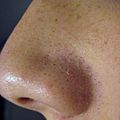Pimple facts for kids
Pimples (also called zits) are a type of acne. They are caused by oil getting trapped in the pores of the skin. Pimples often happen during adolescence or puberty. Practicing good hygiene is essential, but even that might not prevent all pimples.
Contents
What Are Pimples?
Pimples are small bumps that show up on your skin. They are a very common part of a skin condition called acne. Most people get pimples at some point, especially during their teenage years. They can appear on your face, neck, chest, back, and shoulders.
Why Do We Get Pimples?
Pimples form when the tiny holes in your skin, called pores, get clogged up. Your skin has glands that make an oily substance called sebum. Sebum helps keep your skin and hair moisturized.
Hormones and Oil
During puberty, your body produces more hormones. These hormones can make your skin glands produce more sebum. When there's too much oil, it can mix with dead skin cells and block your pores.
Clogged Pores
Once a pore is blocked, bacteria that normally live on your skin can grow inside it. This can cause the area to become red and swollen, leading to a pimple. It's a natural process that many teens go through.
Types of Pimples
Pimples come in different forms. Knowing the types can help you understand them better.
Blackheads and Whiteheads
- Blackheads are small, dark spots. They happen when a clogged pore stays open at the top, and the oil and dead skin cells turn dark when exposed to air.
- Whiteheads are small, flesh-colored or whitish bumps. They form when a clogged pore is completely closed off under the skin's surface.
Red Bumps and Cysts
- Papules are small, red, tender bumps that don't have a head.
- Pustules are red, tender bumps with a white center of pus. These are what most people think of as a typical pimple.
- Nodules are large, solid, painful lumps under the skin.
- Cysts are large, painful, pus-filled lumps under the skin. These are the most severe type of acne and can sometimes cause scars.
Taking Care of Your Skin
Taking good care of your skin can help manage pimples. It's important to be gentle and consistent.
Daily Routine
- Wash your face twice a day, in the morning and before bed. Use a mild cleanser and warm water. Be gentle; don't scrub your skin too hard.
- Use oil-free products. Choose makeup, moisturizers, and sunscreens that are labeled "non-comedogenic" or "non-acnegenic." This means they are less likely to clog pores.
- Keep your hands clean. Try not to touch your face often, as this can transfer dirt and oil from your hands to your skin.
- Shower after sweating. If you play sports or sweat a lot, shower as soon as possible to wash away sweat and oil.
What Not to Do
- Don't pick or squeeze pimples. This can push bacteria deeper into your skin, make the pimple worse, and even lead to scars.
- Avoid harsh scrubbing. Scrubbing your skin too hard can irritate it and make pimples worse.
- Don't share makeup or brushes. This can spread bacteria.
When to See a Doctor
Most pimples can be managed with good skin care. However, sometimes you might need help from a doctor.
- If your pimples are very painful or swollen.
- If you have many pimples that don't go away with regular care.
- If you are worried about scars.
- A doctor called a dermatologist specializes in skin conditions and can offer more treatment options.
Common Questions About Pimples
- Does diet cause pimples? The link between diet and pimples is still being studied. Eating a balanced diet is good for your overall health, but there's no single food that causes or cures pimples for everyone.
- Do pimples mean my skin is dirty? No, pimples are not a sign of dirty skin. They are caused by clogged pores and hormones. Washing your face helps, but it won't stop all pimples.
- Will pimples go away? Yes, for most people, pimples become less common as they get older, usually by their early twenties.
Images for kids


